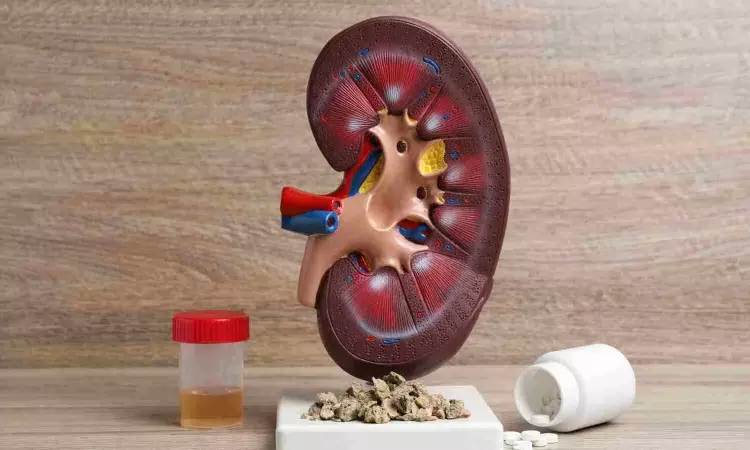- Home
- Medical news & Guidelines
- Anesthesiology
- Cardiology and CTVS
- Critical Care
- Dentistry
- Dermatology
- Diabetes and Endocrinology
- ENT
- Gastroenterology
- Medicine
- Nephrology
- Neurology
- Obstretics-Gynaecology
- Oncology
- Ophthalmology
- Orthopaedics
- Pediatrics-Neonatology
- Psychiatry
- Pulmonology
- Radiology
- Surgery
- Urology
- Laboratory Medicine
- Diet
- Nursing
- Paramedical
- Physiotherapy
- Health news
- Fact Check
- Bone Health Fact Check
- Brain Health Fact Check
- Cancer Related Fact Check
- Child Care Fact Check
- Dental and oral health fact check
- Diabetes and metabolic health fact check
- Diet and Nutrition Fact Check
- Eye and ENT Care Fact Check
- Fitness fact check
- Gut health fact check
- Heart health fact check
- Kidney health fact check
- Medical education fact check
- Men's health fact check
- Respiratory fact check
- Skin and hair care fact check
- Vaccine and Immunization fact check
- Women's health fact check
- AYUSH
- State News
- Andaman and Nicobar Islands
- Andhra Pradesh
- Arunachal Pradesh
- Assam
- Bihar
- Chandigarh
- Chattisgarh
- Dadra and Nagar Haveli
- Daman and Diu
- Delhi
- Goa
- Gujarat
- Haryana
- Himachal Pradesh
- Jammu & Kashmir
- Jharkhand
- Karnataka
- Kerala
- Ladakh
- Lakshadweep
- Madhya Pradesh
- Maharashtra
- Manipur
- Meghalaya
- Mizoram
- Nagaland
- Odisha
- Puducherry
- Punjab
- Rajasthan
- Sikkim
- Tamil Nadu
- Telangana
- Tripura
- Uttar Pradesh
- Uttrakhand
- West Bengal
- Medical Education
- Industry
Diabetes medication to lower the risk of kidney stones says study

Diabetes when left untreated can increase the acidity of the urine. With high blood glucose levels, the acidity of the blood increases, which in turn causes the acid levels in the urine to increase. However several antidiabetic medications are being evaluated to manage them.
Rates of kidney stones are on the rise in the United States and around the world. Type 2 diabetes is associated with increased risk of kidney stones, but some forms of treatment for this condition may also have the benefit of lowering risk of kidney stones.
In a study led by investigators from Mass General Brigham, researchers found that there was an association between the use of sodium-glucose contratransporter 2 (SGLT2) inhibitors and a lower risk of developing kidney stones. Their findings are reported in JAMA Internal Medicine.
Researchers from Brigham and Women’s Hospital and Massachusetts General Hospital, founding members of the Mass General Brigham healthcare system, worked together to conduct the analysis.
The study included data from three nationwide databases of patients with type 2 diabetes who were seen in routine clinical practice. The team analyzed information from 716,406 adults with type 2 diabetes who had started taking an SGLT2 inhibitor or two other classes of diabetes medications known as GLP1 receptor agonists or dipeptidyl peptidase 4 (DPP4) inhibitors. Patients who began taking SGLT2 inhibitors had a 30 percent lower risk of developing kidney stones than those taking GLP1 agonists and about a 25 percent lower risk than those taking DPP4 inhibitors. The findings were consistent across sex, race/ethnicity, history of chronic kidney disease and obesity.
“Our findings could help inform clinical decision making for patients with diabetes who are at risk for developing kidney stones,” said corresponding author Julie Paik, MD, ScD, MPH, of the Division of Pharmacoepidemiology and Pharmacoeconomics and the Division of Renal (Kidney) Medicine at Brigham and Women’s Hospital.
Reference:
Paik JM, Tesfaye H, Curhan GC, Zakoul H, Wexler DJ, Patorno E. Sodium-Glucose Cotransporter 2 Inhibitors and Nephrolithiasis Risk in Patients With Type 2 Diabetes. JAMA Intern Med. Published online January 29, 2024. doi:10.1001/jamainternmed.2023.7660.
MSc. Neuroscience
Niveditha Subramani a MSc. Neuroscience (Faculty of Medicine) graduate from University of Madras, Chennai. Ambitious in Neuro research having worked in motor diseases and neuron apoptosis is interested in more of new upcoming research and their advancement in field of medicine. She has an engrossed skill towards writing and her roles at Medical dialogue include Sr. Content writer. Her news covers new discoveries and updates in field of medicine. She can be reached at editorial@medicaldialogues.in
Dr Kamal Kant Kohli-MBBS, DTCD- a chest specialist with more than 30 years of practice and a flair for writing clinical articles, Dr Kamal Kant Kohli joined Medical Dialogues as a Chief Editor of Medical News. Besides writing articles, as an editor, he proofreads and verifies all the medical content published on Medical Dialogues including those coming from journals, studies,medical conferences,guidelines etc. Email: drkohli@medicaldialogues.in. Contact no. 011-43720751


